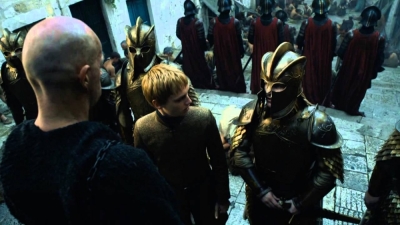Is 'Game of Thrones' Anti-Catholic?

Sunday night, viewers witnessed one of the most shocking moments on "Game of Thrones" - a naked Cersei Lannister taking a penitential "Walk of Atonement" through the capital of Westeros. Earlier this season, we also saw religious authorities arrest the queen's brother for sodomy. Author George R. R. Martin has confirmed that he based the Faith of the Seven on the Roman Catholic Church, so all this begs the question, "Is Game of Thrones Anti-Catholic?"
With the increasing acceptance of homosexuality in American culture and law, many Christians sense a backlash against their religious freedom. Cultural pressure has silenced many Christians who oppose gay marriage and seems to be mounting even further.
For a show to then present the Faith Militant - a radical arm of the Faith of the Seven - as powerful and intolerant of homosexuality in particular seems a veiled attack on Christian faith, and Catholicism. But the show's presentation is far from one-sided.
George R. R. Martin, author of the book series "A Song of Ice and Fire," on which the show "Game of Thrones" is based, crafted a world very similar to Medieval Europe and Britain in particular.
Most people on the show worship the Faith of the Seven. Like Christianity's Trinitarian God of Father, Son, and Holy Spirit, this faith has a god of seven aspects. In septs (its version of churches) people pray to the Father, the Mother, the Smith, the Crone, the Maiden, the Warrior, and the Stranger. These represent justice, mercy, artistry, wisdom, fertility, courage, and death, respectively.
In history, the Faith of the Seven has risen up against the Targaryen dynasty of kings - checking the power of the state, like the Roman Catholic Church in the Middle Ages. An armed group of radical believers formed the Faith Militant to enforce the laws of the faith when the kings tried to suppress it.
Cersei Lannister (Lena Headey), the widow of a previous king and bereaved mother of the last dead king, seeks to retain her power over her second son, King Tommen (Dean-Charles Chapman). Tommen's new wife, Margaery Tyrell (Natalie Dormer), also seeks to manipulate the young king. In the last season, Cersei's father Tywin Lannister kept the peace between them, but after his untimely death, Cersei is unstoppable.
Seeking to attack Margaery, Cersei unleashes the faith. The queen mother convinces Tommen to reinstate the Faith Militant, and soon religious zealots are pouring out wine, emptying brothels, and executing homosexuals.
While this presentation of the Faith may seem anti-Christian or anti-Catholic, it proves more nuanced. "Game of Thrones" portrays religious faith as it is - a powerful human motivation that can make us nobler or when twisted, lead us astray. George R. R. Martin does not like to deal in black and white, and his versions of religious faith are neither fully good nor fully evil.
The Faith Militant empowers common people who have been oppressed by Cersei and the royal family for some time. Back in Season 2, they formed a mob against King Joffrey. The king, incensed that anyone might oppose him, declared, "Kill them, kill them, kill them all!" These commoners rising up in the name of religion may represent justice, as the oppressing Lannister family finally get their comeuppance.
Indeed, one of the masters of the old regime, Petyr Baelish (Aidan Gillen), frequently used money and sex to control people. When the Faith Militant attacks his brothel, they are bringing down an institution not just of debauchery but also of the sniveling elite who once ruled over them.
The face of this new movement, The High Sparrow (Jonathan Pryce), proves a true believer. Despite the machinations of one of the most cunning characters on the show, Olenna Tyrell (Diana Rigg), the sparrow cannot be bought. His dedication to justice and holiness shows a purity unusual in the political world of "Game of Thrones" - a welcome departure from a host of characters who will lie, fornicate, and use magic to attain their goals.
Cersei herself slept with her brother, wished death on a child, killed her husband, and encouraged the brutal slaughter of innocents by her son Joffrey. Her "Walk of Atonement" is well deserved, and indeed it seems like she gets off a bit easy. Even after her public confession of guilt and the painful parade of her nakedness, Cersei is broken, but also ready to get revenge. Her last look is one of defiance, as a new knight, Ser Robert Strong, carries her.
Sunday night, we saw the commons take their revenge - not through force alone, but in piety as well. Cersei's story is still not over - even after her public shaming she awaits a trial for further charges, such as killing the king and conceiving her children with her brother, charges which the audience knows she committed.
"Game of Thrones" has portrayed the power of religion throughout, but this current season has stressed it even further. A recent Washington Post article pointed out that the show confirms the relevance of faith - "Think religion is dead? Just look at Game of Thrones."
The show has portrayed many faiths - the Faith of the Seven, the Red God R'hollor, and the Old Gods of the North, along with many mystical creatures and themes. Martin seems to take an agnostic view of faith - respecting the power of religion over people but denying the idea of an afterlife or a true God behind the world. He may not be a believer himself, but at least he takes faith seriously.




























